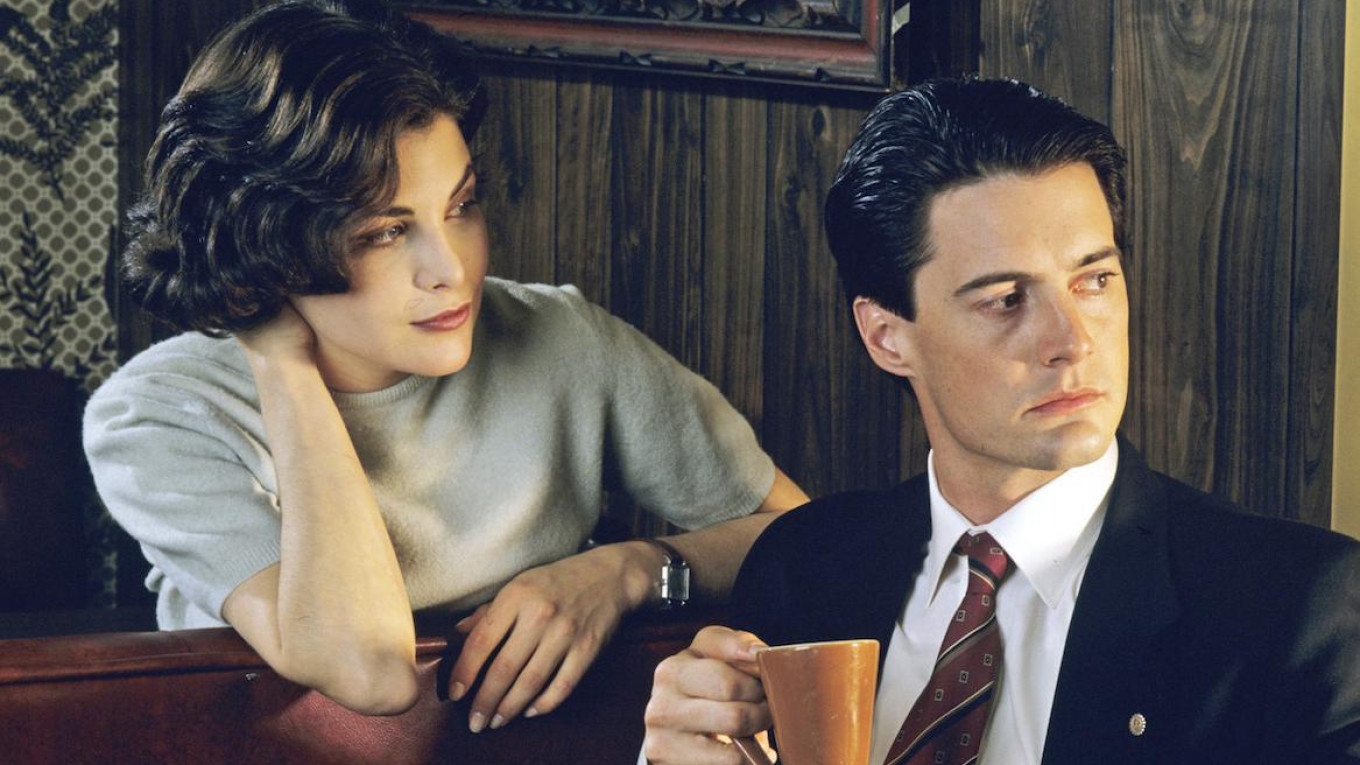Young crime reporter Sergei Sokolov was working for Moscow’s Novaya Gazeta newspaper in the early 1990s when the first series of cult U.S. television drama Twin Peaks was broadcast.
Sokolov was so entranced by David Lynch’s murder mystery set in small-town America that he and three other colleagues made it the subject of a column. Every week, they would pore over the plot details in an attempt to identify the killer.
The title of the column—"Who killed Laura Palmer?"—referred to the prom-queen in the series, whose death prompts FBI Agent Dale Cooper to travel to the town of Twin Peaks in Washington State. In ensuing investigation, he falls in love and unearths a web of sordid secrets and a mystical netherworld.
“Twin Peaks had a huge resonance among young people and everyone went mad over finding out who the murderer was,” says Sokolov, now deputy editor at the newspaper. “In terms of influence there are only two shows that can compare: House and Game of Thrones.”
With a third series of Twin Peaks now available, Russia is revisiting a passion for Lynch’s grandiose, fictional world— one that is populated by fraudsters, demons, drug addicts, rapists and a psychic lady who always carries a log.
“It’s most interesting to follow up on what has happened to us and to Lynch,” Russian author Dmitry Bykov wrote in a recent column for Novaya Gazeta. He describes the original series as a “memorial to the bloody, feverish, glamorous and stupid 1990s.”
The new series features many of the same actors, including Kyle MacLachlan as Agent Cooper. It picks up where series two left off — with Cooper apparently possessed by a demon after a show-down in the paranormal Black Lodge.
Twin Peaks first aired in Russia in November 1993, more than two years after the first two seasons were shown in the United States. Back then, Russians were wild about mass produced Latin American soaps, and Santa Barbara, another American melodrama.
Twin Peaks stood out.
“It was thunder in a clear sky, like chewing gum with a new taste — people tried and they liked it,” says Oleg Bykov, a 36-year-old designer from the Siberian city of Omsk. The superfan manages a Twin Peaks social media community, which has more than 67,000 subscribers.
Much of the appeal of the original series lay in its embrace of mysticism, which flourished in post-Soviet Russia, and in its depiction of life outside of a big city.
“We had only just found out what America was,” says Sokolov. “Twin Peaks showed a rural America that looked like our own countryside.”
The obsession with Twin Peaks in the 1990s reportedly even reached the highest levels of the Russian political elite.
A book about the series, “Reflections: An Oral History of Twin Peaks,” claims that former Soviet President Mikhail Gorbachev was even moved to ask U.S. President George W. H. Bush to find out who killed Laura Palmer, whose naked corpse is found wrapped in plastic in the first episode.
Bush was unable, however, to make Lynch divulge the secret. Gorbachev himself stonewalled a question about the show in a 2014 interview with The Moscow Times, saying he had no recollection of it.
The column penned by Sokolov and his friends was not the only ink spilled in the Russian press about Twin Peaks. In the art and culture section of now-defunct newspaper Segodnya, journalists published long exchanges under the title “Weekly Dialogue,” assessing each episode’s cultural significance.
Since the 1990s, Twin Peaks has continued to win over younger fans in Russia and has been shown again on television a number of times.
“I love Lynch’s work and his approach to life,” says Darya Zaitseva, 24, an architecture student in Moscow. “He is not involved in the day-to-day, he is not interested in world news, he doesn’t read gossip or books about himself. He lives only for his ideas, which means his work is as pure as it’s possible to be.”
The new series, which began last month, has generated a lot of interest and is available to watch in parallel with its release in the United States. But it seems unlikely to provoke the same furor as its predecessors.
“Briefly and rudely you can say that the first four episodes are more mysterious than the entire original series,” a reviewer in daily newspaper Vedomosti wrote. Sokolov said he no longer found it interesting since it had fully entered the realm of the supernatural.
The new series is “chaotic,” says Olga Nikitina, 21, a journalist in Moscow: “Nothing from the episodes that have been shown makes any sense.”
But Twin Peaks fan group coordinator Bykov contends Lynch’s genius is just as strong.
“A quarter of a century has gone by and much has changed,” he says. “We have changed and Twin Peaks has changed. Your favorite gum has just gotten a new taste.”
A Message from The Moscow Times:
Dear readers,
We are facing unprecedented challenges. Russia's Prosecutor General's Office has designated The Moscow Times as an "undesirable" organization, criminalizing our work and putting our staff at risk of prosecution. This follows our earlier unjust labeling as a "foreign agent."
These actions are direct attempts to silence independent journalism in Russia. The authorities claim our work "discredits the decisions of the Russian leadership." We see things differently: we strive to provide accurate, unbiased reporting on Russia.
We, the journalists of The Moscow Times, refuse to be silenced. But to continue our work, we need your help.
Your support, no matter how small, makes a world of difference. If you can, please support us monthly starting from just $2. It's quick to set up, and every contribution makes a significant impact.
By supporting The Moscow Times, you're defending open, independent journalism in the face of repression. Thank you for standing with us.
Remind me later.







